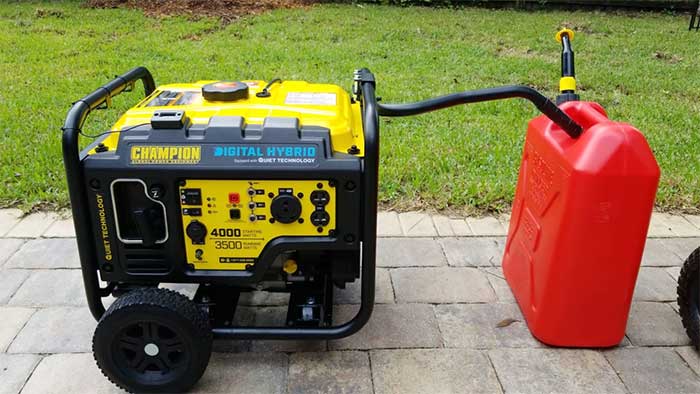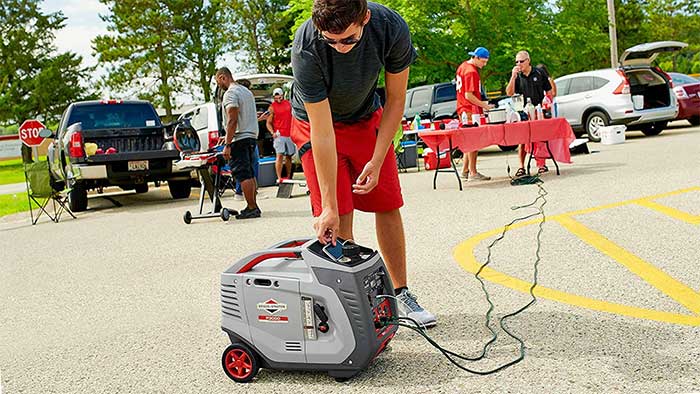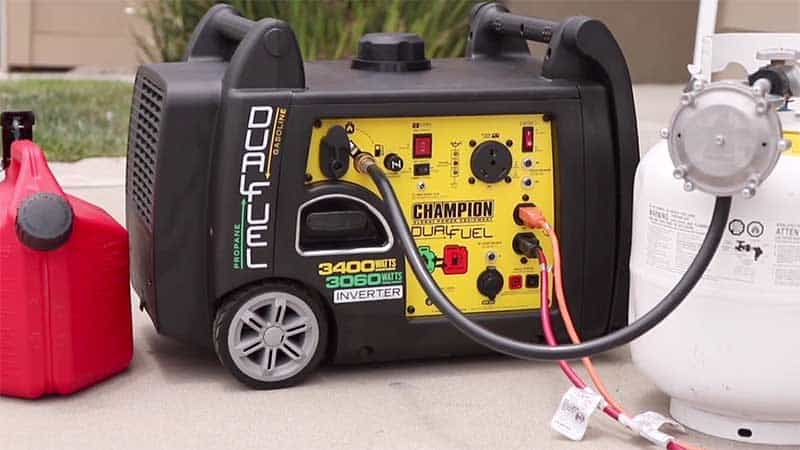Last Updated on April 25, 2023 by Rod Olivares

Have you wondered if you can run your portable generator non-stop? That’s a fair question. Portable generators are a fantastic tool to have during a power outage or in areas where electrical service and weather conditions may be iffy.
The best way to run a portable generator for days or even weeks is with an extended fuel kit with an external hose. With an external tank setup, you can safely refuel the secondary gas container while your generator continues to run on its own internal tank. I like the Bergs system setup, like the single hose clam kit that works great for a Honda 2200i or other 2,000-watt range portable generator. You’ll still need an external tank for that one. For an all-in-one kit, the dual setup kit includes a 6-gallon tank.
Below, we will go over how to make your generator run continuously and what you should know before using your generator in this way.
Can you run a portable generator continuously?
Yes, portable generators can run continuously as long as proper maintenance intervals are given; since gasoline is highly flammable, you’ll want to stop the engine before fueling or refueling any generator.
Additionally, it is important to pay attention to the recommended maintenance schedule for your unit and avoid ever letting it run out of fuel entirely while it is under any load; this could destroy the connected appliances or the generator itself.
Keep in mind, this is a pretty basic answer. To ensure that you’re running your generator properly, there are some other things you’ll need to know.
Let’s go over how exactly to get the most out of your portable generator and what you should be aware of before you run it continuously.
Recommended Running Time and Refueling Requirements

Generally, portable generators are meant to be used as a backup source of power.
This means that almost all of them should only be relied on in the short-term.
While some models have been manufactured to provide power for days at a time, most generators can be run for 8-, 12-, or 24-hour intervals–with a few boasting 72-hours running times.
However, it’s important to know that there aren’t any portable generators out there that should be run for weeks or months at a time without a break. There are a few other universal truths to these hardworking machines. This is why “breaking in” the generator when you first purchase is an important process.
First of all, portable generators need fuel.
Whether you’re using gasoline or propane, you’ll need to give them something to sip on. Even the most fuel-efficient machines can’t run forever without a power source.
Secondly, refueling your generator while it’s on is a bad idea.
This means you’ll have to shut your portable generator off while you refuel it.
So, regardless of your generator’s running time, if it uses up all of the fuel, you’ll have to shut it off for a bit while you feed it.
Why do you have to shut off your generator when you refuel it?
 You may be wondering why you can’t just refuel your portable generator while it’s still running.
You may be wondering why you can’t just refuel your portable generator while it’s still running.
I’d counter that with another question: Have you ever put gas in your car without shutting it off?
To be honest, I have. Living in the frigid northern recesses of the United States sometimes necessitates this.
However, that does not mean it is a good idea. Gasoline is highly flammable.
The hotter your engine is, the more likely you are to ignite something accidentally. Now, gasoline itself isn’t flammable in its liquid form.
You can actually throw a match into a bucket of gasoline if there are no fumes present.
Here’s an article about that from the CCOHS, though I believe the article is recommending that you don’t try that.
The article states that “flammable and combustible liquids themselves do not burn. It is the mixture of their vapors and air that burns.”
So, the real danger comes in with fumes that gasoline releases into the air.
A single spark can ignite gasoline fumes in an instant. This is known as the flashpoint. So if your generator is running low, or “running on fumes,” you want to be careful when refueling. Ergo, you’ll need to shut it off.
How long is the average generator run time?
The most popular portable generator, the Honda EU2200i, gets 8 hours of run time on just about 1 gallon of gas. Your run time will depend on the efficiency of your generator, it’s wattage rating, and the sustained load being drawn from it. A 5,000 watt generator will consume more gas per gallon then most 2,000 watt generators.
How Much Fuel Does Your Gas Generator Hold?
Now that you know why you’ll want to shut your gas generator off when you refuel it, you’ll probably want to consider how much fuel your tank can hold. Most portable gas generators can hold anywhere from 1 to 10 gallons of fuel at a time. A decent gas-powered generator can get anywhere from 10 to 13 hours of run time per tank of gas.
A standard 5,000-watt generator will use around 18 gallons of gasoline during a 24-hour period. If your 8-gallon tank gives you 13 hours of run time, you’ll have to stop and refuel it, say, in the morning and in the evening.
This isn’t too bad, all things considered.
The Firman H05751 7125/5700 Watt 120/240V Electric Start Gas or Propane Dual Fuel Portable Generator does exactly that.
It can be run for around 13 hours at a time on each tank of gas. It’s an all-purpose option that can be used in various scenarios. Plus, it runs on propane. We’ll get into that next.
How long can I run a Dual-Fuel or Propane Generator?
 Most large propane tanks, either above or below ground, hold 500 to 1,000 gallons.
Most large propane tanks, either above or below ground, hold 500 to 1,000 gallons.
Standard propane tanks you find outside your local grocery store are 20lbs and contain 4.5 gallons of propane and weigh about 37 pounds when full.
Expect a propane-powered generator to burn 2-3 gallons an hour.
A 500-gallon tank will power your home continuously for a week. A 1,000-gallon tank will last for 2 weeks.
That being said, your portable propane or dual-fuel generator should still be given rest periods if mandated in your user manual.
Just because you can do something doesn’t necessarily mean that you ought to.
I love the dual-fuel DuroMax XP12000EH as a solid affordable over 10,000-Watt dual fuel generator. If I was buying a propane generator for the first time, this would be my pick.
Since propane burns really clean, you won’t have to worry about harmful residue clogging your carburetor. It is also pretty darn efficient.
There’s a lot of debate about whether propane or gas generators are better for long-term continuous usage. We will take a look at that next.
Gas vs. Propane Generators: Which Will Run Longer?
You may be wondering whether gas or propane is better. The answer is that both are good. It really depends on the situation that you’re in.
Gas Generators: Pros and Cons
Gas generators are super efficient, easy to fix, and reliable. Gas is easy to obtain pretty much anywhere.
Plus, gas burns easily in cold weather.
However, gas may also be expensive and is very flammable.
Also, gas tends to eventually cause all kinds of build-up in your generator’s engine.
You’ll have to clean your carburetor more often and remove any unused gas before storing your unit.
Consider this: almost all gas stations use electricity to power their gas pumps.
This means that in a city-wide power outage, you might not be able to get gas.
Plus, if you are storing your gas at home, you’ll need to have a fuel stabilizer.
Fuel stabilizers are additives that can prolong the lifespan of unused gasoline. (I recommend using Star Tron Enzyme Fuel Treatment for this.)
Propane Generators: Pros and Cons

Propane generators can also be pretty useful.
Propane comes in cylinders that are pretty much impossible to spill. When you do spill propane, it evaporates right away.
This makes it safer to work with in general. Engines running off of propane are also usually a lot quieter than ones running off of gasoline.
In an emergency situation, propane generators are great for power outages.
You don’t need any electricity to fill up a propane tank. Propane also has a really long shelf life.
You can pretty much store propane indefinitely without a fuel stabilizer of any kind. Plus, propane engines are usually quieter while running continuously than gas engines and propane is cheaper than gas for the most part.
That being said, propane engines are more complex than gas engines. This means that if they break, they’re pretty difficult to fix.
Another big problem is that propane isn’t nearly as efficient as gasoline.
You’ll run out of propane much faster if you’re running your generator all day.
Finally, propane is virtually useless in temperatures below 20 degrees Fahrenheit.
For Non-Stop Continuous Power: Get a Dual-Fuel Generator
If you’re trying to keep your generator running for as long as possible without stopping, you’ll want to get a dual-fuel generator with a well-built engine. This way, you’ll be prepared for whatever gets thrown at you.
For more information on dual-fuel inverters, read my post comparing the 10 most popular dual-fuel generators on the market.
It’s pretty quiet, easy to use, and reliable as heck. It also comes with pretty much everything that you need (minus the cover and the fuel) and makes oil changes easier.
Other Things to Consider When Trying to Run Your Generator Continuously
Before you use your portable generator for hours or days on end, you might want to consider that these machines aren’t really designed to be used this way.
If you’re going to run your unit like that, it will break eventually, even if you give it refueling breaks.
The longest I have ever used a portable generator continuously was for around a week.
Before you jump to any conclusions, what I mean is that I ran the thing just about every day whenever I needed power (mostly in the early evening and throughout the night).
You might just need a backup backup generator.
If you really need continuous power, depending on your time frame, it may be cheaper to just get a legitimate non-portable standard generator. However, I understand why many people need the portable factor, too.
Conclusion
You can run your portable generator for a long time as long as you give it breaks to refuel and follow the guidelines in your user manual.
If you keep your generator under continuous load, it will eventually wear out.
That being said, many portable generators can go for a pretty long time and are surprisingly efficient.
I want to know what you think! Have any tips and tricks for running your generator around the clock?
How long have you kept your unit on? Feel free to share, leave your comments, or give your feedback!

Scott Krager purchased generatorgrid.com in the summer of 2020 and quickly began to buy every generator under the sun! He currently has over a dozen generators and the number is growing quickly. He lives in Portland, OR near his family and friends.
GeneratorGrid.com is an independent review business. I am not affiliated with any manufacturers and do not accept paid reviews. When you buy through my links, I may earn a commission which helps me purchase more generators for testing. - Scott Krager


why does my beast idle switch almost let engine die out
One thing you forgot to mention: CHECK THE ENGINE OIL!!! The problem with fueling the generator from large sources, is that the engine can run low on oil, long before you run out of fuel. With gasoline(or diesel), the generator will usually run for a day or night, then, needs to be refueled. That allows you to check and add oil if necessary. If the engine is connected to 500 gallons of propane, I don’t know any small engine that can keep it’s oil for the week or two, that it would take to exhaust that much fuel. Another thing: Check the valve clearance, especially the exhaust valve. If the valve walks into the seat, the lifter could ride the heel of the camshaft, and not be allowed to close. That can lead to serious engine damage. Portable generators do not have hydraulic self adjusting lifters, like cars have. Most of them don’t even have oil filters, which necessitates more frequent oil changes, to keep the particulate matter out of the oil.(some larger units do)
Keep in mind, running a generator for a week non-stop, is 168 hours. No small engine can sustain that, without at least, having the oil level checked.
Honestly I’ve probably had my inverter generator running nonstop about 4800 hours now I mean yes I will stop it to fuel it but sometimes I don’t stop at the fuel it I’ll keep it going which I know is dangerous sometimes but it is what it is sometimes. I have noticed though that the inverter generator gets noisier and noisier the more hours you put on it especially when you run it nonstop. But yes it does eventually wear out I’ve done this once before with the same generator give me about maybe 5000 to 5300 hours before it finally stopped working but I mean I have the warranty and they replace it immediately so it’s pretty cool.
I am running my Generator constantly
And I am not haveing No problem with it at alll